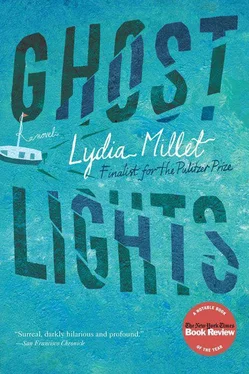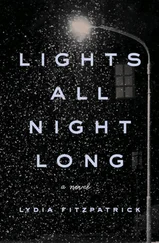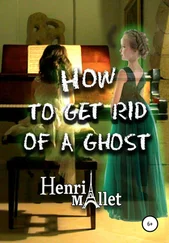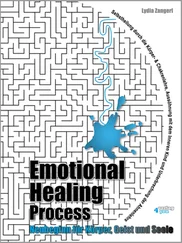Lydia Millet - Ghost Lights
Здесь есть возможность читать онлайн «Lydia Millet - Ghost Lights» весь текст электронной книги совершенно бесплатно (целиком полную версию без сокращений). В некоторых случаях можно слушать аудио, скачать через торрент в формате fb2 и присутствует краткое содержание. Издательство: W. W. Norton & Company, Жанр: Современная проза, на английском языке. Описание произведения, (предисловие) а так же отзывы посетителей доступны на портале библиотеки ЛибКат.
- Название:Ghost Lights
- Автор:
- Издательство:W. W. Norton & Company
- Жанр:
- Год:неизвестен
- ISBN:нет данных
- Рейтинг книги:5 / 5. Голосов: 1
-
Избранное:Добавить в избранное
- Отзывы:
-
Ваша оценка:
- 100
- 1
- 2
- 3
- 4
- 5
Ghost Lights: краткое содержание, описание и аннотация
Предлагаем к чтению аннотацию, описание, краткое содержание или предисловие (зависит от того, что написал сам автор книги «Ghost Lights»). Если вы не нашли необходимую информацию о книге — напишите в комментариях, мы постараемся отыскать её.
How the Dead Dream
Ghost Lights
Ghost Lights
Ghost Lights — читать онлайн бесплатно полную книгу (весь текст) целиком
Ниже представлен текст книги, разбитый по страницам. Система сохранения места последней прочитанной страницы, позволяет с удобством читать онлайн бесплатно книгу «Ghost Lights», без необходимости каждый раз заново искать на чём Вы остановились. Поставьте закладку, и сможете в любой момент перейти на страницу, на которой закончили чтение.
Интервал:
Закладка:
In the end he won her over by arguing that the intentional community was elitist. He added to this an insinuation that it was also racist.
He smiled ruefully at the memory, recalling his earnest youthful idiocy and the forcefulness with which he had prosecuted his aims. He could still hear the discussion, at a party on the beach. She wore faded cutoff jean shorts and her legs were tan and slim. He had held her wrists in his hands and argued passionately that for her to move with the other well-meaning hippies to Mendocino would mean a “renunciation of society” that would lock her into a “white, upper-middle-class cultural ghetto” and ultimately augur “an abdication of personal responsibility.”
After that they had moved into a one-bedroom together — in a white, upper-middle-class neighborhood, of course. She cut her hair and he finished his accounting degree. Eventually the free-love notion faded.
Possibly now, however, the free love had made a resurgence.
He tried to remember how the free love had ended. They had argued about it on and off, but not with great engagement; Susan had always believed it more in theory than practice. She was shy by inclination and reluctant to let others see her naked. But she said the usual things the hippies liked to say back then about the limits of monogamy, such as “Why should the intimacy and joy of sex be reserved for one relationship?” and “People are not property.” Once, almost to prove her point it seemed, she kissed another man at a foreign movie — an individual she barely knew who was French, had body odor and smoked cloying cigarettes. This had provoked a minor drama in the relationship. But in due time the Frenchman retreated, as they were wont to do.
Still, he had never, he reflected, actually asked her formally to renounce the free-love idea. There was nothing contractual, there were no stipulations. He had merely assumed she had grown out of it. In a certain sense it seemed ridiculous now that the matter was unclear to him; most marriages did not allow for such ambiguity. Did they? On the other hand this was not ambiguity, exactly, rather it was an element they had forgotten, a corner left untucked. . it was like a religion that receded, leaving a vague memory of faith but few practical details. The religion had been overtaken by the day-to-day.
He had to admit: there was the possibility that quietly, in a private realm, she was still a believer.
The fragment was imprinted into the pad of his right thumb. He stood beside the rental car and flicked it off with his forefinger. It disappeared instantly; it was too small even to watch flitter down. . to tell the truth, he thought, unlocking the car door, Susan was probably right, or at least had been more honest back then than he had. He had been looking out for himself, frankly. He had known she was too good for him, but also felt that, having attracted her, it was more or less his sovereign right to retain her. Like a lost-and-found coin.
They got married, had Casey and were happy, the three of them. Time passed; the events were not important, only the feel of it. Then the accident happened. Somehow after the accident he had assumed they would always stay as they were, exactly.
In his own case he loved Susan steadily and took for granted that he always would. He had believed until now that she felt the same way. Also, when couples lost a child they frequently divorced, but something like the accident tended to lock you together like clenched teeth. At least that was what he observed in the parents’ groups. Sitting in pairs around the circle, on those hard, awkward chairs, many wives and husbands seemed to share nothing more than a sloping and gray defeat.
When he considered it, though: since the boss man went missing her interest had been diminishing. He had not taken it personally. He had believed she was preoccupied, and this, he thought, was still true. For whatever reason, he had seen, he was currently on the periphery of her life, or at least at the periphery of her attention. By itself this was not a problem; he was comfortable in the background. He often thought of himself on the sidelines, not at the center of the action, and the image was not unpleasant. For a long time there had been more pressing matters than his own needs or preferences; there was Casey first and always and then there was Susan’s job, where she considered her boss a virtual prodigy, a kind of urgent cause that required service.
Why the cause of real-estate profit should now command her fealty, when it had never before done so, he had not seriously questioned. Her sense of professional obligation seemed grounded in the personal, chiefly.
Backing up in the rental car — careful now, careful; he could easily have two accidents in one day — he considered the possibility that her preoccupation had been due not to Stern’s absence, as he had previously reasoned, but to the new chemistry of her small office in the awareness of that absence, a small office now inhabited solely by her and Robert.
2
The mother lived in a small townhouse not far from their own near the Venice — Santa Monica boundary, connected to other units around an open yard. She was not much older than Susan or Hal but apparently somewhat non compos mentis , since she required a live-in attendant. He was not clear whether she suffered from early-onset Alzheimer’s, presenile dementia or some other condition, and Susan did not enlighten him.
They met to visit her at lunchtime, pulling up to the curb at the same time from different directions. Susan had spent the morning at her office, of course, no doubt closeted with Robert, whereas he himself had spent the morning at his office closeted with Rodriguez, who picked his teeth with a plastic cocktail sword. When they stepped out of their cars Hal leaned in to kiss her and breathed in her sweet smell; he also scrutinized her face closely, trying to detect the vestigial presence of the free love.
But there was nothing out of the ordinary. Still his suspicions hovered as he followed her up the front path.
A busty, squarish woman opened the door, a woman with a large mouth and bulbous nose. She had a thick accent, possibly from eastern Europe. She led them in and seated them on a sofa, where a large china cabinet dominated the view.
“You’re lucky. It’s a very good day for her. Clear, you know?”
As they waited Hal gazed through the glass diamonds of the breakfront at a large, Asian-looking soup tureen in faded pink and green, trying to discern what scenes it depicted. He was deciding whether to rise and inspect it more closely when Susan grasped his hand with a sudden fierce need.
“I’m not sure how to tell her,” she whispered. “Even though I practiced.”
He leaned his shoulder against her, but before he could say anything Mrs. Stern came in smiling, wearing white slacks and a linen blazer. A good-looking woman, if a little weak-chinned — thin and pale-blond and somewhat patrician, as though born into wealth and then faded from it.
“Susan,” she said warmly. “It’s so good to see you again.”
“Angela,” said Susan, and rose to embrace her. “This is my husband Hal.”
“A pleasure. And what a wonderful daughter you both have.”
“We think so,” said Hal.
“We used to do jigsaw puzzles, the two of us. I had to give it up though. It’s my vision — I need cataract surgery. Can I get you a drink? Iced tea or coffee? I have a fresh pot brewing.”
“Oh. Sure. Thank you.”
“Yes,” said Hal. “That would be nice. Thanks.”
Roses and leaves and very small Chinamen.
The term was out of favor.
“So what’s the latest,” she said, as she moved into the kitchen. They were separated by an island with barstools. Susan got up nervously, followed her and leaned against it.
Читать дальшеИнтервал:
Закладка:
Похожие книги на «Ghost Lights»
Представляем Вашему вниманию похожие книги на «Ghost Lights» списком для выбора. Мы отобрали схожую по названию и смыслу литературу в надежде предоставить читателям больше вариантов отыскать новые, интересные, ещё непрочитанные произведения.
Обсуждение, отзывы о книге «Ghost Lights» и просто собственные мнения читателей. Оставьте ваши комментарии, напишите, что Вы думаете о произведении, его смысле или главных героях. Укажите что конкретно понравилось, а что нет, и почему Вы так считаете.












